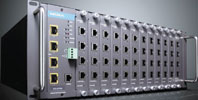

In today’s highly competitive environment it is important to extract every possible benefit from Ethernet technology. To optimise productivity the right tools and techniques are needed to increase operating efficiency and reduce expenditure. This can be done through a convergent network which can leverage network infrastructure to improve productivity.
A convergent industrial automation network is constructed around a shared Ethernet-based platform that transmits not only data but also voice, video and other mission-critical applications. However, this requires a massive amount of bandwidth. With a 10 Gigabit Ethernet (10GbE) core switch solution, bandwidth is no longer an issue.
The Ethernet movement has evolved into one of the most widely implemented protocols for the industrial automation industry. Initially Fast Ethernet with a speed of 100 Mbps was sufficient. However, the demand for network information quickly outgrew this speed. This gave way to Gigabit Ethernet, which increased the speed to 1000 Mbps but was still not fast enough for convergent industrial automation networks. Following this 10 Gigabit Ethernet was introduced and superseded both Fast Ethernet and Gigabit Ethernet with a phenomenal data rate of 10 Gbps.
Commercial or industrial core switches?
A convergent industrial Ethernet network is very important, especially for large scale mission critical automation applications such as those found in the transportation, oil and gas industries, where a massive amount of data, voice, and video needs to be transmitted around the clock. This task calls for a 10 Gigabit Ethernet core switch solution, which has the capability to provide high performance, high port density and bandwidth, and can endure harsh, demanding environments.
While industrial grade 10GbE core switches can provide all of the above features, commercial grade core switches cannot. Commercial switches are made for comfortable IT environments and cannot survive in harsh industrial environments. In addition, commercial switches are equipped with fans which can malfunction unexpectedly and require regular cleaning and replacement. The fault recovery time of commercial switches is measured in seconds, not milliseconds. Furthermore, installation, integration, and troubleshooting of commercial switches for large scale industrial automation networks are both complicated and time consuming.
Commercial switches are often chosen because the initial cost is lower than that of industrial switches. In reality the use of industrial grade products from the beginning is actually more cost efficient since they are made for harsh environments and will ensure the reliability and stability of the network. Moreover, the maintenance cost of industrial switches is much lower due to their rugged construction. Commercial switches do not provide a good price to performance ratio.
Moxa’s solution
The Moxa ICS series industrial core Ethernet switches offer an unbeatable ratio and value proposition. The 48G-port switch is modular and highly scalable and all the switches are backed by a comprehensive implementation and support service at no extra charge. In addition, these switches can be easily integrated into a Cisco or other vendor network to facilitate a single multipurpose convergent network that is extremely stable and reliable.
Moxa’s ICS series core switches combine a comprehensive assembly of industrial features, functions and designs to provide the ideal solution for convergent industrial automation networks. They are the only fanless 10GbE industrial Ethernet switches on the market, and are also the only industrial core switches that offer more than three 10GbE ports for high performance uplinks and downlinks. Network redundancy is measured in milliseconds, not seconds. The network management software simplifies troubleshooting and maintenance for the entire network. To top all these features, the switches are very competitively priced.
| Tel: | +27 11 781 0777 |
| Email: | [email protected] |
| www: | www.rjconnect.co.za |
| Articles: | More information and articles about RJ Connect |
© Technews Publishing (Pty) Ltd | All Rights Reserved